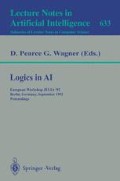Abstract
This paper attempts to demonstrate the wide variety of characteristic properties of defeasible argumentation, of which nonmonotonicity is one. To do so, we introduce a simple formalism, called abstract argumentation system, with which we discuss different methods for raising arguments: forward reasoning, backward reasoning and, in particular, combinations thereof. Resource bounded defeasible reasoning is also briefly dealt with (the prefix ‘defeasible’ is essential here). The main goal of this paper is not to tell how this should be done, but to show how these simple procedures suddenly may change in the context of defeasible argumentation.
Preview
Unable to display preview. Download preview PDF.
References
Bylander, T., D. Allemang, M.C. Tanner, and J.R. Josephson, “Some Results Concerning the Computational Complexity of Abduction,” Proceeding of the First International Conference on Principles of Knowledge Representation and Reasoning (KR'89), pp. 44–45, Morgan Kaufmann (1989).
Dean, T. and M. Boddy, “An Analysis of Time-Dependent Planning,” Proceedings of the Seventh National Conference on Artificial Intelligence, pp. 49–54 (1988).
Etherington, D.W., K.D. Forbus, M.L. Ginsberg, D. Israel, and V. Lifschitz, “Critical Issues in Nonmonotonic Reasoning,” Proceedings of the 1st International Conference on Knowledge Representation and Reasoning, pp. 500–504, Morgan Kaufmann Publishers (1989).
Horty, J.F. and R.H. Thomason, “Mixing Strict and Defeasible Inheritance,” Proceedings of the AAAI, pp. 427–432 (1988).
Konolige, K., A Deduction Model of Belief, Morgan Kaufmann Publishers, Los Altos, California (1986).
Konolige, K., “Explanatory Belief Ascription, notes and premature formalization,” Proceedings of the Third Conference on Theoretical Aspects of Reasoning About Knowledge., Pacific Grove, CA, pp. 85–96, Morgan Kaufmann Publishers (March 1990).
Lakemeyer, G., “On the Relation between Explicit and Implicit Belief,” Proceedings of the Second International Conference on Principles of Knowledge Representation and Reasoning (KR'91), pp. 368–375, Morgan Kaufmann (1991).
Levesque, H.J., “A Logic of Implicit and Explicit Belief,” Proc of the AAAI, pp. 198–202 (1984).
Lin, F. and Y. Shoham, “Argument Systems: A Uniform Basis for Nonmonotonic Reasoning,” Proceedings of the 1st International Conference on Knowledge Representation and Reasoning, pp. 245–255, Morgan Kaufmann Publishers (1989).
Loui, R.P., “Defeat Among Arguments: A System of Defeasible Inference,” Computational Intelligence3(2), pp. 100–106 (April 1987).
Moses, Y., “Resource-bounded Knowledge,” pp. 261–275 in Proceedings of the Second Conf. on Theoretical Aspects of Reasoning about Knowledge, ed. M.Y. Vardi, Morgan Kaufmann, Pacific Grove, California (March 7–9 1988).
Naess, A., Communication and Argument: elements of applied semantics, George Allen and Unwin, London (1966). Translation of: En del elementaere logiske emner.
Nute, D., “Defeasible Reasoning and Decision Support Systems,” Decision Support Systems4(1), pp. 97–110, North-Holland (1988).
Nute, D., “Defeasible Reasoning: a philosophical analysis in PROLOG,” Aspects of Artificial Intelligence, pp. 251–288, Kluwer Academic Publishers (1988).
Pollock, J.L., “Defeasible Reasoning,” Cognitive Science11, pp. 481–518 (1987).
Pollock, J.L., “A Theory of Defeasible Reasoning,” International Journal of Intelligent Systems6, pp. 33–54, John Wiley & Sons, Inc. (1991).
Poole, D., “Explanation and Prediction: an Architecture for Default and Abductive Reasoning,” Computational Intelligence5, pp. 97–110 (1989).
Prakken, H., “A Tool in Modelling Disagreement in Law: Preferring the Most Specific Argument,” Proceedings of the Third International Conference on Artifiical Intelligence and Law, St. Catherine's College, Oxford, England, ACM Press (1991).
Provan, G.M., “The Computational Complexity of Assumption Based Truth Maintenance Systems,” technical report 88–11, University of British Columbia, Department of Computer Science, Vancouver B.C., Canada (July 1988).
Rescher, N., Dialectics: A Controversy-Oriented Approach to the Theory of Knowledge, State University of New York Press, Albany (1977).
Rescher, N., Methodological Pragmatism: A Systems-Theoretic Approach to the Theory of Knowledge, Basil Blackwell, Oxford (1978).
Vreeswijk, G.A.W., “Abstract Argumentation Systems: Preliminary Report,” Proceedings of the First World Conference on the Fundamentals of Artificial Intelligence, Paris, pp. 501–510, Angkor (1991). A full version is to appear in Studia Logica.
Vreeswijk, G.A.W., “Interpolation of Benchmark Problems in Defeasible Reasoning,” report IR-255, Department of Mathematics and Computer Science, Vrije Universiteit Amsterdam (September 1991). Presented at the Second Symposium on AI and Mathematics, Fort Lauderdale, Florida.
Vreeswijk, G.A.W., “The Feasibility of Defeat in Defeasible Reasoning,” Proceedings of the 2nd International Conference on Knowledge Representation and Reasoning, pp. 526–534, Morgan Kaufmann Inc. (1991).
Vreeswijk, G.A.W., “Defeasible Dialectics: A Controversy-Oriented Approach towards Defeasible Argumentation,” report IR-265, Department of Mathematics and Computer Science, Vrije Universiteit Amsterdam (December 1991). To appear in The Journal of Logic and Computation
Vreeswijk, G.A.W., “Nonmonotonicity and Partiality in Defeasible Argumentation,” pp. 157–180 in Nonmonotonic Reasoning and Partial Semantics, ed. W. van der Hoek, J.-J.Ch. Meyer, Y.H. Tan, C. Witteveen, Prentice Hall (1992).
Author information
Authors and Affiliations
Editor information
Rights and permissions
Copyright information
© 1992 Springer-Verlag Berlin Heidelberg
About this paper
Cite this paper
Vreeswijk, G. (1992). Reasoning with defeasible arguments: Examples and applications. In: Pearce, D., Wagner, G. (eds) Logics in AI. JELIA 1992. Lecture Notes in Computer Science, vol 633. Springer, Berlin, Heidelberg. https://doi.org/10.1007/BFb0023429
Download citation
DOI: https://doi.org/10.1007/BFb0023429
Published:
Publisher Name: Springer, Berlin, Heidelberg
Print ISBN: 978-3-540-55887-3
Online ISBN: 978-3-540-47304-6
eBook Packages: Springer Book Archive

